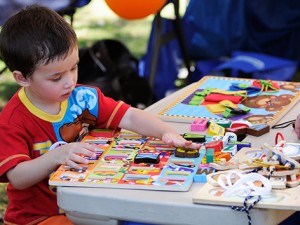Puzzles – Child
 Putting a puzzle together can be an enjoyable activity alone or with others.
Putting a puzzle together can be an enjoyable activity alone or with others.
Did you know?
Allowing your child time to work it out themselves helps to develop problem solving skills and pride in their own successes. If your child is finding it difficult, help them by discreetly moving the correct pieces closer or prompting them to rotate pieces, before they become frustrated and stop.
Add language
Make comments and ask occasional questions to promote reasoning and thinking skills.
Talking about how shapes and objects are similar and different provides the language to match the visual perception and develops cognitive skills.
Other development
Puzzles are an activity that has a clear end and children can recognise their success. This helps to build self-esteem and emotional development.
Picking up and placing small puzzle pieces helps your child to choose their preferred hand and refine their hand skills.
Completing puzzles together is a fun way to develop teamwork, sharing and turn taking skills.
As children develop and try more complex puzzles, they learn early maths and science concepts such as a whole is made of parts.
Variations
Simple, 3D construction pieces are another way to enjoy puzzles e.g. foam puzzle pieces that can make a house.
You could make your own puzzle by cutting up pictures or drawings.
Safety
Always supervise children with scissors if making your own puzzles.
Across the ages
All the activities listed on our “Play Ideas” page can be applied across different age groups. See how puzzles can be fun for babies, toddlers and playgroups.
Activities listed under “child” are suitable for children 3 years and older. Children of this age enjoy more complex activities where they can develop their skills and use their imagination while playing with friends.

